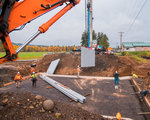
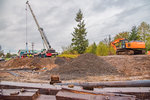
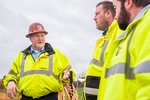
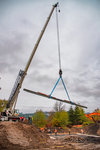
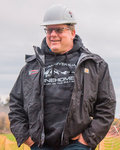


Most structures are not assembled overnight.
But along narrow Howanut Road, parallel to the Black River in the Oakville area, that’s the goal for one particular project.
The Confederated Tribes of the Chehalis Reservation and its contractors gathered at a work site early Friday morning to assemble an innovative steel and concrete bridge that will replace a half-century-old wooden structure and secure a vital roadway that connects the eastern and western parts of the reservation.
Four truckloads of reinforced steel components were trucked from Oklahoma to the reservation this week. The goal was to assemble the pieces within the burrowed roadway and backfill it with 175 cubic yards of concrete — all within a day.
“The Tribe’s really excited to be working with Premier Steel on this. This is a bridge that we’ve been needing to replace for a long time,” said Amy Loudermilk, planning director with the Chehalis Tribe.
About 500 vehicles use the roadway on a daily basis, Loudermilk estimated.
Premier Steel Services, an Oklahoma-based company, designed and manufactured parts for the innovative “Fast Cast Bridge” structure.
Only about 10 of the highway-grade bridges have been installed in the U.S., company President Andy Vanaman told The Chronicle while at the site Friday, and there are five similar projects currently being designed.
The bridge type is cost-effective and an efficient solution for repairing failing infrastructure. Vanaman said his company has been partnering with small municipalities to install these on low- to medium-traffic roadways.
This is the first structure of its kind to be installed in a West Coast state.
“It’s been great to work with the Chehalis Tribe,” Vanaman said.
Beginning at 8 a.m., about a dozen or so laborers with general contractor Rognlin’s Inc. began lifting the walls of the structure to be set and installed in the foundation. Clad in a hard helmet, reflective gear and with a trio of cigars hanging from his vest pocket, Vanaman paced the site and instructed the laborers on its assembly as a 120-foot crane carried pieces from a truck bed.
Brian Rockey, a project manager at Rognlin’s, looked on as the pieces were set. Their company, he said, does a lot of construction for conventional bridges, schools and wastewater treatment plants, but Friday’s project was quite unlike anything they’ve assembled. Vanaman’s expertise was crucial.
A conventional concrete bridge might take anywhere from three to four weeks to assemble, Rockey said, but the concrete on Premier Steel’s “one-day bridge” should be set in about a week. The secret for the project’s expediency lies in the mont of worth of work Premier did to assemble and ready the steel components for assembly.
“It’s just changing the labor in its form,” Vanaman said.
The “Fast Cast” bridge will also be installed in a timelier manner than a box culvert could, since companies have backlog orders of more than a year out.
Bryan Sanders, transportation planner, and Brian von Clück, utility construction project coordinator, both with the Chehalis Tribe, said this was an exciting project for them and the community.
The project is estimated to cost a little north of $1 million, Sanders said, with funds contributed by the Tribe and the federal Department of Interior’s Bureau of Indian Affairs (BIA).
The Tribe for many years has been attempting to court the BIA into “failing” the decrepit bridge so that they could fund a replacement. After years of attempting so, the BIA finally came through during a 2019 inspection.
“They failed the bridge, which put it through a process of funding a replacement,” Sanders said.
The BIA eventually awarded the Chehalis Tribe with $687,000, Sanders said, and the Tribe contributed the last leg of funding necessary to get the project underway.
Demolition of the old bridge, constructed decades ago by Grays Harbor County, finally started Oct. 11. A narrow dirt path was furnished around the site.
Howanut Road serves as a critical thoroughfare for both tribal and nontribal travelers. It’s the only major east-to-west road that runs through the reservation, von Clück said.
The roadway also lies between the Chehalis and Black rivers. During wet months, the Chehalis will often flood into a nearby field, under Howanut Road and into the Black River, Sanders said.
Recent floods may have accelerated the wooden bridge’s decay. The life of Premier’s steel “Fast Cast” bridge, though, is expected to be much longer than the original wood one. Sanders said that during the last year of its life, the wood bridge was only open as a one-lane route due to a damaged guardrail.
The Chehalis Tribe hopes to have the new Howanut Road bridge paved next month and fully open to traffic shortly after.